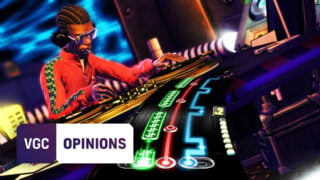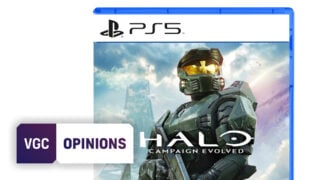3 years later, Returnal remains PS5’s most special exclusive
In Housemarque, Sony has a endless fountain of creativity that it needs to nurture, massive sales or not
Jordan Middler

In a world of 200 million dollar games, studios don’t get to make a Returnal very often.
Returnal is an extremely difficult, narratively obtuse roguelike, which the majority of players will only ever see the first level of. That is not a recipe for a game published by PlayStation. That is not a game on the side of a London bus. Returnal doesn’t sponsor the Champion’s League final.
Where the last decade of PlayStation’s dominance has been characterized by absolute blockbuster hits like The Last of Us, God of War, and Horizon, Returnal is a modern cult classic and remains the most exciting thing published by PlayStation Studios in years.
Returnal excels because it blends the arcade-style, hyper-frenetic gameplay that Housemarque has been refining for decades with the big-budget sensibilities of a Sony blockbuster.

It’s like when you find a tiny horror film you fall in love with, only to discover a shell studio made it under The Walt Disney Company.
But while Returnal may virtually unique in Sony’s current portfolio, it has far more in common with the most acclaimed and popular releases of the last few years than it may appear on the surface.
It’s an ultra-difficult, beautiful, single-player-only game, with a story that’s almost impossible to parse unless you go down a lore rabbit hole. Sounds pretty Soulsy to me.
Players have shown time and again that if you give them something new, something that makes them feel like they’re actively improving against a huge challenge, and something that makes them feel smarter by playing it, then they’ll be fiercely loyal to you.
That’s not to say that Returnal is perfect (although it’s incredibly close to my heart), but this could be Housemarque’s Demon Souls moment. Returnal is built on the bones of Housemarque’s arcade efforts, like the perenially underrated Resogun, culminating in a stepping-out party that Sony should have pushed to the absolute moon, and I suspect in a different era, would have.
There are two opposite lessons that Sony could learn from Returnal.
“It’s an ultra-difficult, beautiful, single-player-only game, with a story that’s almost impossible to parse unless you go down a lore rabbit hole. Sounds pretty Soulsy to me.”
The first is to allow studios like Housemarque to do what they want to do, provide the financial might, and you’re far more likely to end up with an incredible game. This is the type of game that builds loyalty to a publisher and excitement about what is coming next.
Games like Returnal are the antidote to the constant chorus of, “we’re making more live service.” It’s something that Sony is uniquely positioned to do. Players will be much more accepting of Generic Live Service 2 if that’s what is paying for games like Returnal to exist.
It’s almost a throwback to Sony’s weirder days. We’ve lamented the death of weird PlayStation on this website plenty, but Returnal is exactly the kind of game the publisher used to make when it was striking out and trying new things. Plus, while Returnal is probably never going to appeal to the masses, you don’t get to your God of War Ragnaroks without letting developers take a punt on God of War.
The other lesson is, unfortunately, reflective of the game’s rather disappointing performance. While there are a few factors to this, including the fact that when the game came out it was probably easier to complete the game than to find a PlayStation 5 at a reasonable price, when the cold hard numbers men at Sony reflect on Returnal, it wasn’t the money maker it wants.
Personally, and I’m sure almost everyone reading this will agree, I don’t care.

Games like Returnal should be the kind of thing Sony gets to make a reward for a The Last of Us remake selling millions. It’s the kind of game the catalog should be littered with. Games that offer something a bit different. Look at the way that fellow Finnish studio Remedy Entertainment was treated following the release of Alan Wake 2.
While it’s in a genre that’s a bit more palatable to a mainstream audience, it’s a very weird game, with a laser-clear focus that is uncompromisingly Remedy.
Sure, a survival horror game is going to get more people through the door than a tough-as-nails roguelike, but a level wherein you play through a musical about the main character’s life is cut from the exact same cloth as fighting a 20 ft demon as it plays Blue Öyster Cult’s Don’t Fear The Reaper on an organ made from the planet.
I am far more optimistic about the future of Housemarque now that it’s in the PlayStation Studios family than I would be if it was on the outside. While Sony’s future seems set on chasing a trend that will likely be dead by the time they catch up to it, having a Housemarque in its back pocket is a strength that few big publishers can match.
Sony hasn’t abandoned Returnal. The incredible soundtrack by Bobby Krlic received a vinyl release. The game even received campaign co-op and survival mode.
But I can’t escape the feeling that Returnal may be a one-and-done masterpiece that sits on PS Plus for the remainder of the PS5’s lifecycle, relegated to “This is the best PS5 game you’ve never played,” articles just like this.

The game’s director, Housemarque veteran Harry Krueger, has left the company, and it’s already working on a new title, which it claims will be a new IP rather than a sequel.
But regardless of whether we ever get another one, three years on, you should play Returnal. Or play it again. Or in my case, for the fourth or fifth time.
If you’re the type of player who rolls their eyes into their skull at 100 MPH every time a new live service gets announced, you should be screaming and shouting about games like Returnal, before they’re made extinct by men in suits with calculators.














